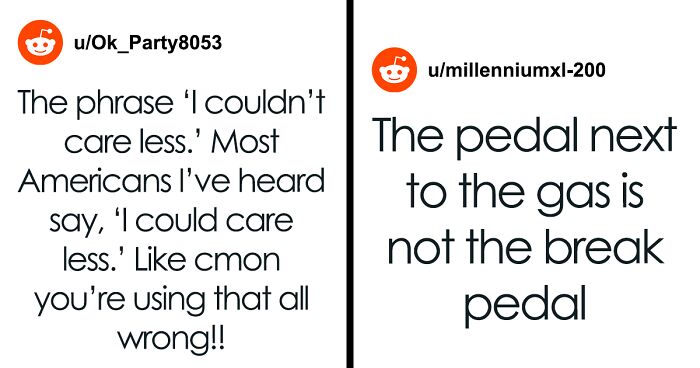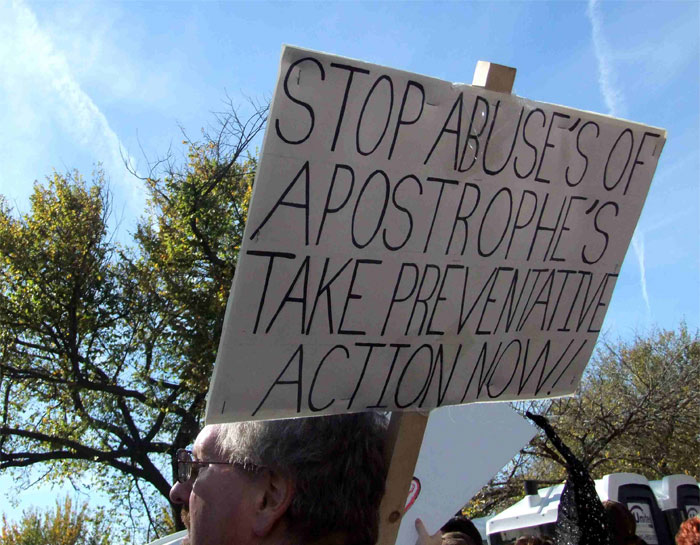
30 Grammar Rules That Many People Fail To Use Correctly, As Pointed Out By Members Of This Online Group
Isn’t it weird that humans learn how to use language to communicate with others without needing to put in that much effort? But if we want to write and read or to perfect it and make our linguistic abilities more sophisticated, we need to actually study the language. Despite starting strong and already being able to talk and understand others in childhood, we spend years learning our languages at school, but in the end, not everyone manages to acquire it completely.
Those who are more receptive to languages often get irritated by the mistakes other people make in spoken or written language. It really shows in a Reddit thread where a person asked “What is something that most people don’t use correctly?” and half of the answers consisted of people naming misused words and grammar errors others make.

Image credits: Martha Soukup
More info: Reddit
This post may include affiliate links.
The phrase “I couldn’t care less” Most Americans I’ve heard say, “I could care less”. Like cmon you’re using that all wrong!!
Incredibly: should’ve. I’ve seen a ton of people write “should of” when they mean should’ve (as in should have) and in my opinion that’s worse than confusing “then/than”.
The they're/there/their and to/too/two. It's a pet peeve of mine when people say "This is to boring." In any situation when they use the wrong "to." My mates had taken University-level English classes in highschool yet they still make the "there" or "to" mistakes, and it makes my blood boil.
I didn’t even go to college and I still manage to use the right one every single time.
Less vs. fewer. Less is for uncountable nouns: you have less time, less pain, less work to do. Fewer is for countable nouns: you have fewer apples, fewer cans of soup, fewer distractions. People usually use less when they should use fewer; it rarely happens the other way around. People will say "there are less cars on the road," but they probably won't say "there is fewer traffic." There is a related problem with much vs. many. To be fair, what is countable and uncountable can get complicated, and it's easy to make mistakes (I do it too). You can't have fewer money, you can only have fewer dollars and cents (money, amusingly, is uncountable). You can't have fewer pizza, but you can have fewer pizzas (pluralization of something uncountable makes it countable).
I understand this is technically correct, but not only does this not impede effective communication (you know exactly what they meant) but since language evolves over time, I suspect in the future this distinction will be eliminated and these two words cross-pollenating one another will be considered acceptable, or if nothing else slang.
I'm gonna go get an expresso and excetera.
Than/then
"Than" is used when you are comparing two items. Use "then" when you are discussing order in time. Examples: I ate pizza, and "then" took a nap! I ate more pizza "than" wings!
Apostrophes.
Apostrophes are such a pain to explain as they can indicate two things - possession (such as Robert's book or Mary's bicycle) and abbreviation (where letters have been omitted should've, would've, could've, won't). Then you have to try to explain it's to someone. Is it possession or abbreviation? Its is possession and it's is abbreviation. And they go "what?".
grumpyoldmanBrad said: Affect/Effect Daddict replied: It's so easy. Affect is a verb. Except when it's a noun. Effect is a noun. Except when it's a verb. No idea why people mix these up.
Affect is first, effect is second. Usually in casual conversation, affect will be a verb (her emotions affected the decision), and effect will be a noun (the effect was that she got two dozen donuts instead of one). Affect as a noun means sort of your vibe, as in (his affect was one of confidence), effect as a verb is basically the same as affect, doing something that changes something else, but effect is usually used when making that specific change was the goal (he wanted to effect a change in legislation). Affect as a verb means your action has some consequences in the situation around you, effect as a verb means you are doing something for the specific purpose of making that change. One is unintentional, the other is intentional. Hope that clears things up.
APART If you participated in something you were “a part” of it. If you are “apart” from something or someone you are deliberately not a part.
"Anyways" the correct word is "anyway". Anyway already denotes any possible way. Adding an S does nothing other than show your ignorance.
Same with saying “payed” instead of “paid”. This one drives me insane the most.
*exspecially
breath, breathe, and breathing. Makes me wanna kill someone more than I already do.
AtomBombBaby42042 said: Woman/women! smooshf**kie replied: Right! But people don't get man/men wrong. Why is it that people can tell the difference between man/men but not woman/women?
Is this a thing? I can't recall seeing someone mix up woman and women. Is it happening a lot?
Weary vs wary too. I am weary of the misuse of homynyms.
Weary is not a homonym of wary but, for all I know, could be a homynym, whatever that is.
Punctuation
Barley when they mean barely. That one grinds my gears.
"Begs the question" It doesn't mean to raise the question. It's a form of circular reasoning where the argument requires the conclusion to be true, rather than the argument supporting the conclusion.
People say: You can't have your cake and eat it too. The traditional correct phrase is: You can't eat your cake and have it too. Nowadays the two ways of saying it are pretty much used interchangeably.
Does it make a difference though? Philosophically? In Switzerland we have that saying aswell, slightly different. There’s a bread called weggli, and it often has a chocolate coin(foifer). And usually when you share one get the weggli, the other the coin: thus :you can’t have the weggli and the foifer.
The English language
One time I passed a couple of college students. One was from Iran and the other from Korea. They were speaking in English, but their accents were so strong I could barely understand more than every third word. I was impressed how they could understand each other.
Also ‘you’ll’ for ‘y’all’
Lately, more and more people are pronouncing the word "theater" as if it only has two syllables, and rhymes with "sweeter."
I know English is an ever-evolving language, but that’s just wrong!
Homonyms are really hard for dyslexic people, it has nothing to do with ignorance. Linguistic discrimination exists, so does literacy privilege. If you can understand what the meaning was just roll with it.
My mum and Gran were both English teachers. I grew up having these grammatical rules emphasised regularly, then I had a severely dyslexic daughter and realised how insane the English language is. Now when I come across the mistakes talked about here I try to remember that English may be a second language, they may be dyslexic or they just had a crappy teacher.
On behalf of my dyslexic family members, thank you. It's a shame that people get judged and slammed for something they are little able to change.
Load More Replies...I mean if I know what the person is trying to say. I'm not going to make them feel bad about spelling errors. It's like being upset because someone breaths the same air as you. People are dyslexic or have a harder time with spelling and writing. If you know good and well what the person means and you still go out of your way to bring up the spelling error. That makes you the b******e. To busy tearing people down for things that don't truly matter. People have just lost all understanding and regard for everything and everyone. Being s h i t t y when there's really no need. Is just sad really. Now if you truly cannot comprehend what someone is saying. You still don't need to point out their errors. You can kindly and respectfully talk to them and say I'm not really understanding but I want to, can you explain more? I guess making people feel less than is okay to some people. But it's really not.
Homonyms are really hard for dyslexic people, it has nothing to do with ignorance. Linguistic discrimination exists, so does literacy privilege. If you can understand what the meaning was just roll with it.
My mum and Gran were both English teachers. I grew up having these grammatical rules emphasised regularly, then I had a severely dyslexic daughter and realised how insane the English language is. Now when I come across the mistakes talked about here I try to remember that English may be a second language, they may be dyslexic or they just had a crappy teacher.
On behalf of my dyslexic family members, thank you. It's a shame that people get judged and slammed for something they are little able to change.
Load More Replies...I mean if I know what the person is trying to say. I'm not going to make them feel bad about spelling errors. It's like being upset because someone breaths the same air as you. People are dyslexic or have a harder time with spelling and writing. If you know good and well what the person means and you still go out of your way to bring up the spelling error. That makes you the b******e. To busy tearing people down for things that don't truly matter. People have just lost all understanding and regard for everything and everyone. Being s h i t t y when there's really no need. Is just sad really. Now if you truly cannot comprehend what someone is saying. You still don't need to point out their errors. You can kindly and respectfully talk to them and say I'm not really understanding but I want to, can you explain more? I guess making people feel less than is okay to some people. But it's really not.

 Dark Mode
Dark Mode 

 No fees, cancel anytime
No fees, cancel anytime 












































































